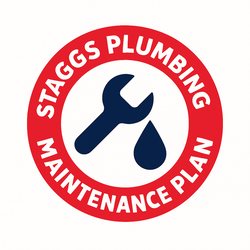Plumbing FAQ for Homeowners
Plumbing FAQ
How do I unclog a toilet?
The simplest way to unclog your toilet is by using a plunger. However, you can also unclog your toilet by filling it with soap or laundry detergent, adding a pot of boiling water, and waiting a few minutes to flush. If you notice that your toilet keeps clogging, however, this might be a sign of a deeper problem in your system, so you should contact our team right away.
How do I fix a garbage disposal?
If your garbage disposal is clogged, turn it off and insert an Allen wrench into the hole of the disposal motor. Continue rotating the wrench until the blockage has been removed. Be careful to never put your hand in the disposal unless you can ensure no one will accidentally switch it on.
How can I prevent frozen pipes?
Frozen pipes can be prevented by allowing your sink faucets to run on a slight drip during colder months — especially if you plan to be away from your home.
How do I clean my dishwasher?
The best way to thoroughly sanitize your dishwasher is to fill the detergent container with white vinegar and run it on a long, hot cycle without any dishes inside
What is the best way to keep my shower drain free from clogs?
You should always make sure to clear any hair away from the shower strainer every time you use the shower or tub. However, another way to keep the drain from clogging is by mixing cider vinegar with baking soda and pouring down this down the drain with hot water every two months.
Which is the best drain cleaner for removing clogs?
It is not a good idea to use over-the-counter drain cleaners, since the harsh chemicals and byproducts within these powders and liquids tend to erode your drain even more, causing worse problems down the road. If vinegar and baking soda is not resolving your issue, reach out to our team for thorough troubleshooting.
How much will it cost to fix my plumbing problem?
The cost to fix a plumbing problem can vary based on the complexity of the problem. At Staggs Plumbing, we charge a diagnostic fee to cover the cost of our technician visiting your home and doing a careful inspection of the problem. Once we determine the location and complexity of the problem, the supplies we may need, and precisely how long it may take, we will be able to give you an accurate estimate of how much your specific plumbing solution may cost!

Slab Leak FAQ
What is a slab leak & what causes slab leaks?
Your home’s concrete foundation, or “slab,” can shift with weather and soil changes. The soil in North Central Texas has a high clay content, which causes it to expand in the dry heat and contract in the wet cold.
As this occurs, the heavy concrete slab can move around, stressing the water and sewer lines that come up through the foundation. These lines include:
- Cold water supply lines from the city water utilities
- Hot water lines for your water heater
- The sewer and drain lines
Over time, slab leaks can result in consequences such as:
- Additional friction and pressure between the foundation and the underlying water and sewer lines
- Pipes and joints weakening
- Water and sewer lines developing cracks, breaks, and/or holes
Once you have a slab leak, water can make its way up through microscopic cracks in the concrete foundation, resulting in foundation leaks.
How can I tell if my home has a slab leak?
Homeowners might not know if they have a slab leak until several days, weeks, or even months after it starts. A big reason for this is that it can take time for leaking water to make its way up through a concrete slab and start to give off warning signs, like:
- Warm spots on the floor
- Sounds of running water in your home when no plumbing appliances or fixtures are running
- A water heater filling back up when hot water has not been used
- Damp flooring and/or walls
- Signs of water damage on floors and/or walls
- Moldy smells around your home or a rotten egg-like smell coming from your water
- A running water meter when no water is being used in your home
- Spikes in your water bill
Can a slab leak be ignored?
If gone unchecked, leaks under the foundation of your home will cause significant structural damage, affecting the value of your home and potentially exposing your family to mold risks.
A delay in detection and repair will eventually cost more, as the leak causes more damage. Many of our customers are shocked to find out just how much damage a relatively small leak can cause over time.
How are slab leaks detected?
Slab leak detection devices are used to locate breaks in water supply lines. Here’s how this is typically done:
- The water supply to a house is turned off.
- The plumber will force air into the lines to push out the remaining water.
- Once the water has been removed from the supply lines, air will escape from the cracks in the water line.
- Using the slab leak detection device, the plumber will listen for the sound of escaping air to zero in on exactly where the leak(s) are occurring.
It is important to work with a plumbing company that is experienced in locating slab leaks. If they can’t accurately detect the source of the leak, you could end up facing bigger headaches and more costs — especially if more foundation needs to be excavated or some leaks are overlooked.
Staggs Plumbing has been repairing slab leaks since 1990, and we have received numerous consumer awards for exceptional service and results. When you want the job done right the first time, your best move is to contact Staggs Plumbing for expert slab leak detection and repair services.
How are slab leaks repaired?
Once the source of the leak has been located, there are normally two options to access the broken pipe.
Slab Leak Repair With Tunnels
This method requires digging a large tunnel under your house for the plumber to crawl through and access the broken pipe(s). They will normally find the closet outside the wall to the source of the leak and tunnel directly to it.
Tunneling is a labor-intensive process that can take several hours to complete, depending on the distance. Once the tunnel has reached the leaking pipe, it is normally a quick process to repair or replace the damaged line.
Digging Up the Concrete Slab to Repair Leaks
This method involves jackhammering through the concrete of your home’s foundation. Since the concrete can be 8 inches to 15 inches thick, a commercial-grade jackhammer is required to break through the slab.
Repairing a Broken Water or Sewer Line
Water and sewer lines can be made of different materials, like PVC, copper, or even iron in some older Plano-area homes. If there is significant corrosion in copper or iron pipes, Staggs Plumbing will replace sections of pipes to avoid further degradation.
Repairs to a simple break in the water line usually involve cutting out and replacing the damaged section of the pipe. If copper is being replaced, it will be “sweated” on with a torch and solder. PVC pipe fixes will need to use the appropriate type of PVC glue for high-pressure water lines.
How much does it cost to fix a slab leak?
The costs of slab leak repair depend on several factors, like:
- Where the leak is located
- Number of leaks present
- Whether tunneling and/or digging is necessary
- The nature of your pipes and, specifically, whether repair or replacement is required
Often, slab leak detection is covered by homeowners insurance, but you may be responsible for the deductible, plus the cost to actually fix the broken pipe. Check your insurance policy and ask your insurance agent for clarification.
How to choose the right plumber for slab leak detection & repair
- Ask for referrals from people you trust.
- Look for top-rated plumbing companies online.
- Check the plumbing company’s rating with the Better Business Bureau.
- Verify a plumber’s licensing and credentials.
Staggs Plumbing has built a reputation by word of mouth. The consistent work we receive from referrals is one of the biggest compliments we get.


